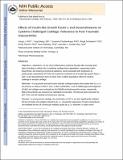Effects of insulin-like growth factor-1 and dexamethasone on cytokine-challenged cartilage: relevance to post-traumatic osteoarthritis
Author(s)
Chubinskaya, S.; Schoeberl, B.; Florine, E.; Kopesky, P.; Li, Yang; Grodzinsky, Alan J; Wang, Yang; ... Show more Show less
DownloadEffects of insulin.pdf (2.082Mb)
PUBLISHER_CC
Publisher with Creative Commons License
Creative Commons Attribution
Terms of use
Metadata
Show full item recordAbstract
Objective: Interleukin-1 is one of the inflammatory cytokines elevated after traumatic joint injury that plays a critical role in mediating cartilage tissue degradation, suppressing matrix biosynthesis, and inducing chondrocyte apoptosis, events associated with progression to post-traumatic osteoarthritis (PTOA). We studied the combined use of insulin-like growth factor-1 (IGF-1) and dexamethasone (Dex) to block these multiple degradative effects of cytokine challenge to articular cartilage.
Methods: Young bovine and adult human articular cartilage explants were treated with IL-1α in the presence or absence of IGF-1, Dex, or their combination. Loss of sulfated glycosaminoglycans (sGAG) and collagen were evaluated by the DMMB and hydroxyproline assays, respectively. Matrix biosynthesis was measured via radiolabel incorporation, chondrocyte gene expression by qRT-PCR, and cell viability by fluorescence staining.
Results: In young bovine cartilage, the combination of IGF-1 and Dex significantly inhibited the loss of sGAG and collagen, rescued the suppression of matrix biosynthesis, and inhibited the loss of chondrocyte viability caused by IL-1α treatment. In adult human cartilage, only IGF-1 rescued matrix biosynthesis and only Dex inhibited sGAG loss and improved cell viability. Thus, the combination of IGF-1 + Dex together showed combined beneficial effects in human cartilage.
Conclusions: Our findings suggest that the combination of IGF-1 and Dex has greater beneficial effects than either molecule alone in preventing cytokine-mediated cartilage degradation in adult human and young bovine cartilage. Our results support the use of such a combined approach as a potential treatment relevant to early cartilage degradative changes associated with joint injury.
Date issued
2014-11Department
Massachusetts Institute of Technology. Department of Biological EngineeringJournal
Osteoarthritis and Cartilage
Publisher
Elsevier
Citation
Li, Y. et al. “Effects of Insulin-like Growth Factor-1 and Dexamethasone on Cytokine-Challenged Cartilage: Relevance to Post-Traumatic Osteoarthritis.” Osteoarthritis and Cartilage 23.2 (2015): 266–274.
Version: Author's final manuscript
ISSN
1063-4584
1522-9653